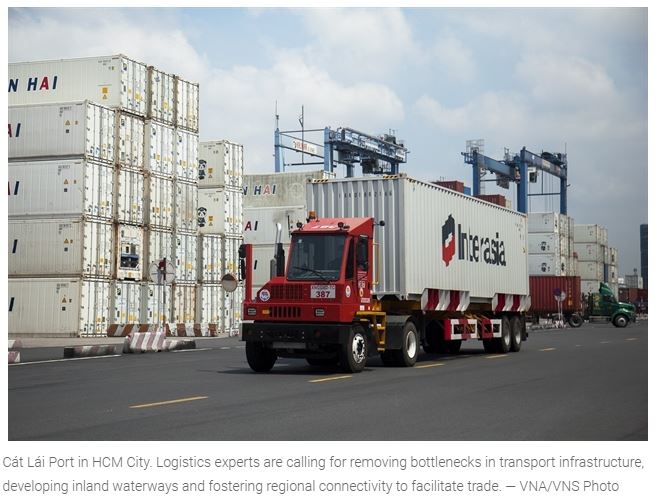Vietnam: Connectivity key to developing logistics in southern key economic region: experts
Removing bottlenecks in transport infrastructure, developing inland waterway ports and fostering regional connectivity hold the key to developing the logistics sector and facilitate foreign trade in the southern key economic region, experts have said.
HCM CITY — Removing bottlenecks in transport infrastructure, developing inland waterway ports and fostering regional connectivity hold the key to developing the logistics sector and facilitating foreign trade in the southern key economic region, experts have said.
The southern key economic region, consisting of HCM City and Đồng Nai, Bình Dương, Bình Phước, Bà Rịa – Vũng Tàu, Tây Ninh, Long An, and Tiền Giang provinces, plays an important role in the country’s economic development, accounting for 35 per cent of GDP and more than 40 per cent of government revenues and foreign trade.
But it is in danger of stagnation due to bottlenecks in infrastructure, they said.
Speaking at a seminar on the development of logistics in the region in HCM City on April 6, Đặng Vũ Thành, vice president of the Vietnam Logistics Business Association, said there is still a lack of infrastructure like roads connecting with seaports, and the port network is fragmented.
Some Government policies have not been promptly amended to dovetail with the current status of the sector, and there are no mechanisms to create effective intra-regional linkages between localities in the region, he said.
These have affected logistics development and made it difficult to reduce trade costs and time, he added.
Đỗ Xuân Minh, director of the logistics services centre at port operator Saigon Newport Corporation, said the compounded annual growth rate of Việt Nam’s logistics sector is expected to be 5.5 per cent in 2022- 27.
But logistics development in Việt Nam, especially its southern region, is facing difficulties in terms of infrastructure at ports and roads connecting warehouses, he said.
The southern region handles 45 per cent of the country’s goods, including more than 60 per cent of container traffic, through port systems in HCM City and Bà Rịa-Vũng Tàu, but roads remain the main mode of transport and they are usually congested due to overloads and lack of highways.
He said localities in the region should develop waterway transport to ease the load on roads and reduce logistics costs.
Thành said in the context of limited resources it is not advisable to invest in many projects, and priority should be given to the construction of key transport works and arterial roads such as the Bến Lức – Long Thành and HCM City – Mộc Bài expressways and highways connecting ports.
It is imperative to dredge the waterways in the Mekong Delta to exploit waterway transport, he said.
The association said more and more logistics firms have invested in infrastructure, modern warehouses and technology to help customers optimise time and costs.
They want the Government to have policies and take specific actions to create better infrastructure connectivity with seaports and airports, especially between industrial parks and raw material areas, to facilitate trade and reduce costs, it said. — VNS


 English
English




